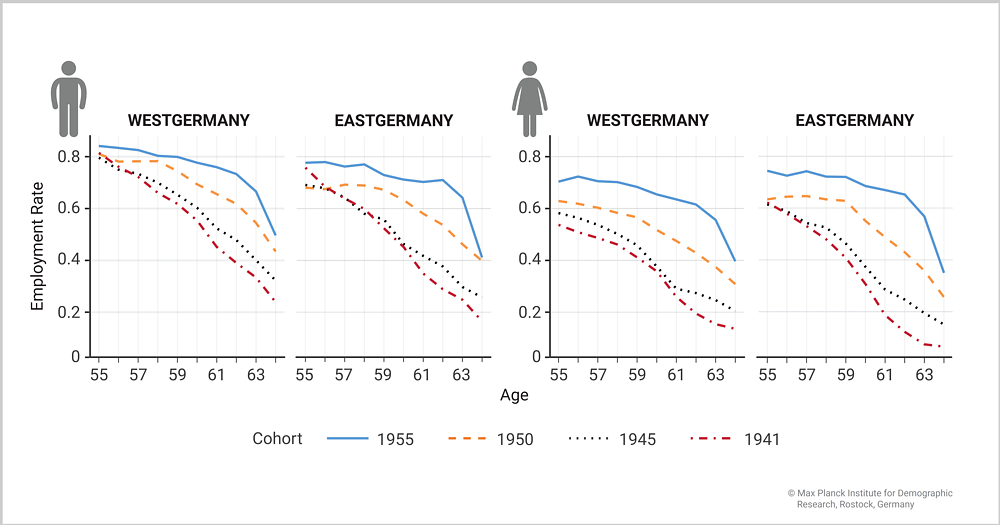July 18, 2023 | Press Release
Work life is getting longer in Germany - but there are big differences
Can extending work lives be a solution to the future problems of an aging society? If everyone works longer and retires later, the number of people paying into the pension system will increase. Little is known about work life in Germany. Researchers at the Max Planck Institute for Demographic Research (MPIDR) in Rostock and the Federal Institute for Population Research have now conducted a study to examine how the length of work life in Germany has changed and what influence the numerous labor market and pension reforms of recent decades have had.

© iStockphoto.com/RainStar
The research team, led by Christian Dudel, Deputy Head Labor Demography (MPIDR), analyzed data from the German Microcensus. "Since 2002, there have been several policy measures and reforms in Germany aimed at extending work lives. These measures are usually designed for people with a high degree of integration in the labor market, i.e. people with a high income and a long and stable employment record. We asked ourselves whether this can work at all, or whether it has worked so far," says Dudel, explaining the motivation for the study. The study looked at birth cohorts from 1941 to 1955 and working ages from 55 to 64. The period from 1996 to 2019 was considered in eastern and western Germany. The analysis was carried out according to gender, level of education and professional qualification.

Age-specific employment rates from age 55 to age 64 (Western Germany / eastern
Germany) © MPIDR
Work life is getting longer
One positive finding is that the length of work life in Germany is increasing across all cohorts in all educational levels and occupational fields - for both men and women. However, there are significant differences in the length of working life. Highly educated West German men have the longest work lives. On average, they work three times as long as women with low educational attainment in eastern Germany. Nevertheless, East German women as a whole have a longer work life than women in West Germany. This is partly due to the different histories of eastern and western Germany. "One reason for the longer work lives is that older workers are staying longer in the labor market, which has remained more or less stable in Germany in recent years. But among people with very low levels of education and in low-skilled occupations, participation rates are rising only very slowly," Dr. Dudel explains.
People on low incomes are at a disadvantage
In the past, before the recent labor market reforms, the focus was on making early retirement more attractive. It was less about preventing people from being forced out of the labor market in old age. "The challenge for the future will be to initiate policies that enable people to work longer without increasing inequalities between different groups of workers," said Dr. Dudel. In particular, people with low educational attainment will be at a severe disadvantage.
"The baby boomers will soon reach retirement age. The impact on the labor market could possibly be mitigated by the fact that those born after 1955 are increasingly better educated and could therefore potentially work longer. Nevertheless, forecasts from other countries show that the increase in work life could soon stagnate," says the Rostock researcher.
About the MPIDR
The Max Planck Institute for Demographic Research (MPIDR) in Rostock investigates the structure and dynamics of populations. The Institute’s researchers explore issues of political relevance, such as demographic change, aging, fertility, and the redistribution of work over the life course, as well as digitization and the use of new data sources for the estimation of migration flows. The MPIDR is one of the largest demographic research bodies in Europe and is a worldwide leader in the study of populations. The Institute is part of the Max Planck Society, the internationally renowned German research organization.
Original Publication
Christian Dudel, Elke Loichinger, Sebastian Klüsener, Harun Sulak, Mikko Myrskylä: The Extension of Late Working Life in Germany: Trends, Inequalities, and the East–West Divide. Demography 10850040. https://doi.org/10.1215/00703370-10850040
Contact
Christian Dudel
Deputy Head Labor Demography
dudel@demogr.mpg.de
Mikko Myrskylä
Director of MPIDR
myrskyla@demogr.mpg.de
Silvia Leek
Head of Public Relations
presse@demogr.mpg.de
+49 381 2081-143